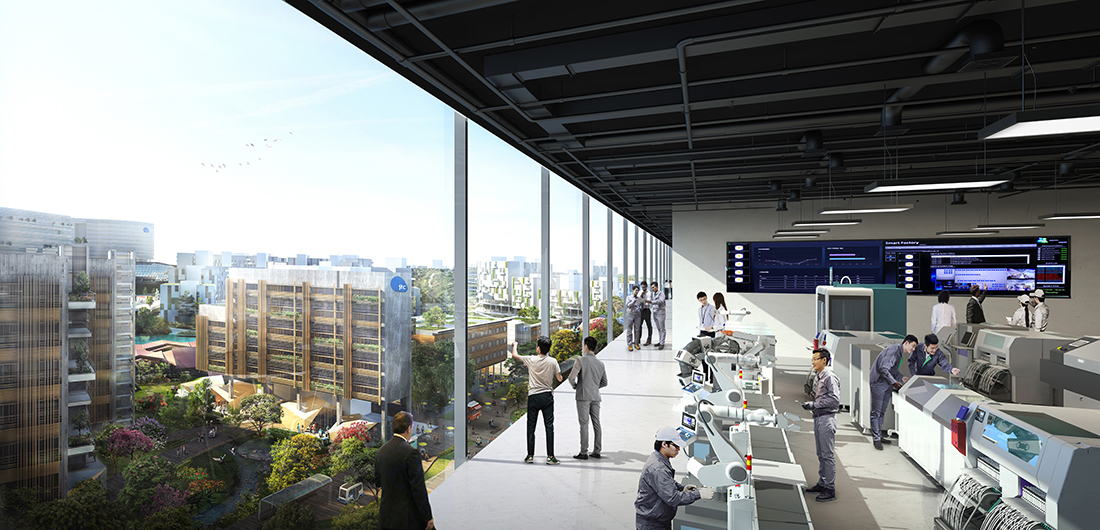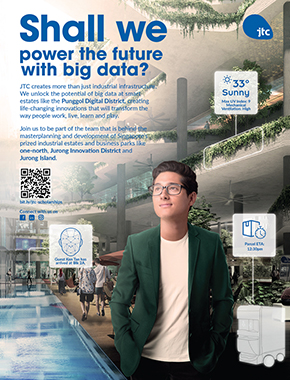Alexis Ku works with consultants to design manufacturing spaces to meet the needs of i4.0 companies. She holds a Master of Engineering (Mechanical Engineering) from Imperial College London. The all-action scholar once finished a solo-hike from Italy, Switzerland to France and does parkour in her free time.
Manufacturing has progressed with the advent of Industry 4.0 (i4.0). Smart factories are modern and attractive, home to cutting-edge technology like Internet of Things (IoT), robotics and automation. These are propelled by brilliant minds who harness digitalisation to revamp the way we work and boost efficiency.
To help Singapore enter this new age of manufacturing, JTC Corporation (JTC) is building smart, and collaborative ecosystems - creating beautiful, interactive and green estates that are attractive places for workers and the community. It also works closely with industry partners to curate ecosystems that encourage collaboration and growth.
For Alexis Ku, JTC Undergraduate Scholar, this means leaving the “dull and boring” manufacturing of old behind and embracing i4.0 companies led by IoT-driven technologies, augmented decision making and advanced automation. Her work as a Mechanical Engineer in the Technical Services Division is to design manufacturing spaces for these companies, which typically utilise cutting-edge equipment and consume greater amounts of power.
Alexis shares with us her life in JTC and what it means to embrace industrial change.
How did you get interested in your current field?
My uncle, who was a helicopter engineer, would bring me to industry events like Singapore Airshow and Family Day at the present day Seletar Aerospace Park (SAP), and it was always exciting to see the aircraft come to life. It got me thinking about the mechanics of how things could get from point A to point B. This led me to take up a Mechanical Engineering diploma in Singapore Polytechnic, where the hands-on experience further cemented my interest in the field. Hence, I further pursued Mechanical Engineering in university as well.

Alexis’s passion for sustainability led her to intern at ComCrop, where she harvested the crops from its urban farm.
What made you choose the JTC Undergraduate Scholarship?
At the time of scholarship application, I was interning at a relatively new urban farm called ComCrop, which looks at utilising rooftop spaces to grow food to feed our local community. When I found out that JTC was working with ComCrop to rent out roof spaces for urban farming, I was impressed at how such a big, established organisation was willing to reach out to and support such a young company. Much more so as they were both in seemingly different industries! This, for me, underscored JTC’s commitment to balancing the sustainability and economic needs of Singapore.
Back when I was applying, I noticed on the BrightSparks portal that JTC was one of the few organisations offering scholarships for Mechanical Engineering. Upon further research, I saw how JTC was (and continues to be) involved in innovative, large scale engineering projects such as Jurong Rock Caverns and one-north. This really caught my interest as I could see myself being a part of a team that builds Singapore’s future in the industrial sector.
Having a scholarship with JTC would not only allow me to alleviate the financial stress on my parents, but also give me a head start in contributing to an organisation that has a direct impact on both the economic and physical landscape of Singapore.
Tell us more about your role and responsibilities.
As a mechanical engineer in JTC, I work with consultants to design manufacturing spaces which are green, urban and can meet the needs of i4.0 companies which normally require greater energy consumption to support more high tech equipment. As JTC is the building owner and estate developer, we are in a position to aggregate companies’ electrical consumption and negotiate for discounted electrical tariffs so that our tenants enjoy greater cost savings.

Artist’s Impression of Jurong Innovation District
Tell us how your work in JTC is contributing to Singapore’s future economic landscape.
JTC does not only build industrial spaces, through mixed-use developments and the adoption of technology, but we also transform the way people work, live, play and learn. We attract industrialists to set up businesses in Singapore and create jobs.
In a previous project where we focused on land allocation to companies, I contributed to the team that liaised with Hyundai to make sure that the land intended for the company had sufficient infrastructure (i.e. water, sewer, electricity) to meet their demands. As manufacturing has evolved so much, we had to understand and meet the needs of such high-tech companies.
Currently, I am working on two projects – Bulim Square at Jurong Innovation District (JID) and Punggol Digital District. Both of these projects are geared towards i4.0 where exciting clean and green technologies blossom with IoT, improving manufacturing efficiency.
What do you love about your job?
I am extremely grateful that I can be at the forefront of providing the infrastructural solutions to support our industrial sector. I especially enjoy the challenge the industrial sector brings, as customers have specific requests that require certain levels of customisation. While it takes years before we see any fruition, keeping the end goal in mind helps me stay on track.
What is your most significant career achievement to date?
The most significant work I have done would be the implementation of the District Cooling System (DCS) in Bulim Square at JID. DCS centralises cooling needs, resulting in space and cost savings with a reduction in the district’s carbon footprint. It is an innovative urban utility service involving the centralised production of chilled water that is piped to commercial buildings for air-conditioning. Instead of individual buildings having their own chillers, the DCS housed at Bulim Square allows for sharing of chiller capacity across buildings in JID, thereby reaping the benefits of economies of scale. I am proud of this project as we not only help our tenants save cost but in a bigger and more meaningful way, save our earth by reducing the carbon footprint as fewer chillers are purchased.
It’s not a common sight to have females in a male-dominated engineering field. How do you feel being a female engineer?
To be honest, I don’t feel any difference in JTC as all engineers get equal opportunities here. I would say to all female engineering students out there who are worried, just be confident in your own views and stand up for what you think is right. Never be afraid to ask for help!
What advice would you give to aspiring scholars looking to join JTC?
If you are looking for a challenge, look no further as JTC offers you the opportunity to take on big projects. You will need to be very committed and driven. Engineers like myself get the chance to manage estate-level projects and find innovative ways to meet the different design requirements of customers.


